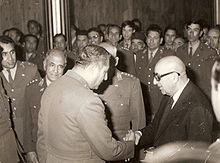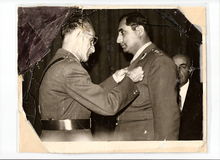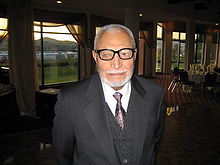- Mohammed Asif Safi
-
Mohammed Asif Safi
محمد آصف صافيBorn 1923
Alikhil District, Laghman Province, AfghanistanDied July 26, 2010 Nationality Afghan Ethnicity Pashtun Occupation Army General in the Afghan National Army Known for Military service Religion Muslim General Mohammed Asif Safi (1923 — July 26, 2010) (Pashto:تور نجنرال اركا نحرب محمد آصف صافي) was an Army General in the Afghan National Army during King Zahir Shah's rule in Afghanistan, and later during the 1970s era of President Mohammed Daoud Khan. General Asif Khan was supporter of a strong and unified military made up of all the ethnic groups in Afghanistan.
Contents
Early life and education
General Asif Khan was born in Laghman province of Afghanistan. His father, Mohammed Ayub Khan, was a local Malik of Alikhil district. At age four, Asif Khan attended Afghanistan's National Army school (Pashto: Arbi Shwanzai). In 1944, he graduated from Afghanistan’s National Army University (Pashto: Arbi Pohantoon) with highest honor. In 1945, he went to India for higher education, and attended an Army Institute in the city of Ambala. In 1955, he went to Turkey where he obtained a Master Degree with highest honor. In 1959, he went to Turkey for second time to obtain a Doctorate Degree (Pashto:أركانارب Arkaan e Arb). He attended the Turkish War Colleges Command (Turkish: Harp Akademileri Komutanlığı), which is the same Army Institute attended by Mustafa Kemal Atatürk and many other world known Turkish and International army officers.[1]
Career
Asif Khan did not affiliated with any political movement or party in Afghanistan. He always dedicated his service to Afghanistan's people and security. In 1962, Asif Khan was appointed as Commander for Officer’s University of Heytyaat. In 1967, he was appoint as Commander and Professor at Officer’s Higher University (Dari: Course of Haa, Haa being short for Haali = Higher). During this time hundreds of Army Officers were trained under him, and he established himself a unique position in Afghan Army. He was considered one of the most educated and influential Officer in the Army. Based on his qualification and the respect that he earned in Army, Asif Khan was promoted to the rank of General in 1970.
In 1973, General Asif Khan was appointed as the Commander of Air Defense at Qala-i-Jangi of Kabul Province. In 1974, he was appointed as the Director of Army’s Ministry of Education (Pashto: Taleem-O-Tarbia). In 1975, he was appointed as the Commander of Army’s 12th Infantry in Gardēz (Persian: گردیز, Pashto: ګردېز), the capital of Paktiā province of Afghanistan. In 1976, he was appointed as the Commander of Army’s 20th Infantry in Nahrin, a town in Baghlan Province of north-eastern Afghanistan. Also during this year he was promoted to the rank of Lieutenant General (Pashto; توران جنرال Tooran General).
Political turmoil of afghanistan
In 1973, while Mohammed Zahir Shah was in Italy, his cousin and former Prime Minister Mohammed Daoud Khan staged a coup d'état and established a Republican Government with himself as President. During this time, General Asif Khan was forced out of Army since he did not assisted Daoud Khan in his coup. Eventually President Daoud Khan met with General Asif Khan and acknowledge his service for Afghanistan and not for the King Zahir or Monarchy. President Daoud Khan re-appointed General Asif Khan to the Army and promoted him to higher position later on.
In 1973 short after Daoud Khan's rise to Presidency, a coup attempt, which may have been planned before Daoud Khan took power, was subdued shortly after his Presidency. Former Prime Minister Mohammad Hashim Maiwandwal (Pashto: محمد هاشم میوندوال ) was arrested in this plot. Whether Maiwandwal was in on the plot from the start is open to question. This led to the arrest of Mohammad Hashim Maiwandwal and 20 others, including General Mohammed Asif Safi. General Asif Khan was jailed for two weeks and later on released. President Daoud Khan personally apologized to General Asif Khan for the arrest and for forcing him out of the Army. General Asif Khan cautioned and advised President Daoud Khan during this meeting of the threat of rising Communist movement, and specifically named Babrak Karmal as one of the members of this movement. Maiwandwal was killed by Parcham (Pashto: پرچم meaning "Banner" or "Flag") wing of the Communist movement (who controlled Interior Ministry) during his custody. General Asif Khan was deeply moved by the assassination of Maiwandwal, who was a prominent figure in Afghanistan’s history. In General Asif Khan’s personal diaries, he noted former Prime Minister Mohammad Hashim Maiwandwal’s assassination as the beginning of Afghanistan's sad history.
On April 19, 1978, PDPA leaders such as Nur Muhammad Taraki, Hafizullah Amin and Babrak Karmal, launched a bloody coup d'état against President Daoud Khan. Daoud Khan and most of his family were shot in the presidential palace the following day. General Asif Khan was in Nahrin when he heard the news. He was not able to bring his Infantry to Kabul to assist President Daoud Khan. When General Asif Khan returned to Kabul, he was put under house arrest by the newly Communist regime for a short period of time, and later on forced to an honorable retirement. This put an end to General Mohammed Asif Safi's Fifty One (51) year of honorable Service to People and Army of Afghanistan.
Achievements and contributions
General Asif Khan was a true soldier of free Afghanistan. He has proudly served his whole career to defend the sovereignty and independence of Afghan nation. He was a strong supporter of a powerful and unified Afghan National Army. General Asif Khan has received numerous Medal of Honor for his excellence in National Service. He has received medals from Marshal Sardar Shah Wali Khan Ghazi, King Zahir Shah, President Daoud Khan and etc. General Asif Khan had traveled numerous times on behalf of Defense Ministry to other countries for weapon purchase and signing defense contracts. He had accompanied King Zahir Shah on an official state visit to Russia in 1967. General Asif Khan was the Security in Charge (Pashto: Yaawar) to many foreign dignitary and heads of state visiting Afghanistan, including Iran’s Prime Minister Amir-Abbas Hoveida’s official visit to Afghanistan.
General Asif Khan's biography in honor of his service to Afghanistan has been written in the Defense Ministry even today. His work as leading Instructor of Cours-e- Haa, Air Defense, and for translated numerous military books and articles from Turkish to Pashto and Dari was recognized even during communist regime of Afghanistan.
Post Service Life
During the communist regime many prominent former military Officers were assassinated or forced to flee Afghanistan. General Asif Khan was put under house arrest twice during President Nur Muhammad Taraki and Hafizullah Amin. He was not harmed because Asif Khan was not associated with any political movement of any sort and his life during service was absolute transparent and honest. At the end of 1979 when Babrak Karmal came to power with it came the Soviet Invasion of Afghanistan. General Asif Khan was very hurt by the invasion of his country which he defended all his life. Asif Khan developed deep medical depression during this time and when he wanted to leave country his passport was denied. General Asif Khan did not want to travel to Pakistan by land. During this period General Asif Khan was invited to many Government sponsored events but Asif Khan denied to attend, except those related to Afghanistan’s military history and culture.
In 1986, when Dr. Mohammad Najibullah became president some freedom of movement and expression was restored in Afghanistan. However, security was constantly destabilizing during this time.
General Asif Khan did attended Loya Jirga under President Dr. Najibullah but he concluded that the country was moving towards even farther destruction. During the presidency of Dr. Najibullah the Defense Ministry honored General Asif Khan’s service by putting his name and biography officially as the leading Instructor of Cours-e- Haa and Air Defense. Also during this period General Asif Khan was given a Diplomatic passport and all the travel restriction on him were removed. General Asif Khan painfully left his country for India in 1989. He moved to United State in 1997 where he peacefully lived final years of his life. In 2005, General Asif visited Mecca to fulfill Hajj and completed pilgrimage at age 81. General Asif khan died of natural causes on July 26th 2009. General Asif Khan’s grave site is located in Sacramento Muslim Cemetery in northern California. General Asif Khan left behind his second wife and twelve children, six daughters and six sons.
References
Categories:- Pashtun people
- 1923 births
- 2009 deaths
- Afghan military personnel
Wikimedia Foundation. 2010.





